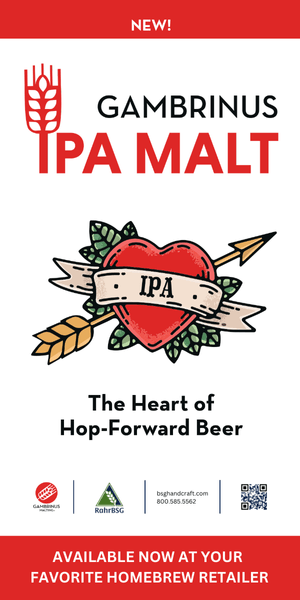North Coast’s Old Rasputin clone
North Coast Brewing Co.’s Old Rasputin clone
(5 gallons/19 L, all-grain)
OG = 1.090 FG = 1.022 IBU = 85 SRM = 39 ABV = 9.8%
Ingredients
15.5 lbs. (7 kg) Maris Otter pale ale malt
1 lb. (0.45 kg) British light crystal malt (35 °L)
1 lb. (0.45 kg) crystal malt (120 °L)
0.5 lbs. (0.23 g) brown malt
0.5 lbs. (0.23 g) chocolate malt
0.25 lbs. (113 g) roasted barley
22.75 AAU Nugget hops (60 min.) (1.75 oz./50 g at 13% alpha acid)
1 oz. (28 g) Northern Brewer hops (0 min.)
1 oz. (28 g) Centennial hops (0 min.) Wyeast 1007 (German Ale) or White Labs WLP036 (Dusseldorf Alt) yeast
2/3 cup corn sugar (if priming)
Step by Step
Mill the grains, then mix with 23.5 quarts (22.2 L) of 165 °F (74 °C) strike water to reach a mash temperature of 152 °F (67 °C). Hold this temperature for 60 minutes. Vorlauf until your runnings are clear, and lauter. Sparge the grains with enough water to obtain 6.5 gallons (24.6 L) of wort. Boil for 60 minutes, adding hops according to the ingredient list and Irish moss if desired. After the boil, chill the wort to slightly below fermentation temperature, about 63 °F (17 °C). Aerate the wort with pure oxygen or filtered air and pitch yeast. Ferment at 64 °F (19 °C), for the first seven days, then free rise to 70 °F (21 °C) and hold there until the completion of primary fermentation. Once the beer completes fermentation, reduce temperature to 32 °F (0 °C), then bottle or keg the beer and carbonate to approximately 2.25 volumes.
North Coast Brewing Co., “Old Rasputin” clone
(5 gallons/19 L, extract with grains)
OG = 1.090 FG = 1.022 IBU = 85 SRM = 39 ABV = 9.8%
Ingredients
10.6 lbs. (4.8 kg) Maris Otter liquid malt extract
1 lb. (0.45 kg) British light crystal malt (35 °L)
1 lb. (0.45 kg) crystal malt (120 °L)
0.5 lbs. (0.23 g) brown malt
0.5 lbs. (0.23 g) chocolate malt
0.25 lbs. (113 g) roasted barley
22.75 AAU Nugget hops (60 min.) (1.75 oz./50 g at 13% alpha acid)
1 oz. (28 g) Northern Brewer hops (0 min.)
1 oz. (28 g) Centennial hops (0 min.) Wyeast 1007 (German Ale) or White Labs WLP036 (Dusseldorf Alt) yeast
2/3 cup corn sugar (if priming)
Step by Step
Bring 5.4 gallons (20.4 L) of water to approximately 162 °F (72 °C) and hold there. Steep grains for 15 minutes, then remove bag and allow to drain into the wort. Add liquid extract while stirring, and stir until completely dissolved. Boil for 60 minutes, adding hops according to the ingredient list and Irish moss if desired. After the boil, chill the wort to slightly below fermentation temperature, about 63 °F (17 °C). Aerate the wort with pure oxygen or filtered air and pitch yeast. Ferment at 64 °F (19 °C), for the first seven days, then free rise to 70 °F (21 °C) and hold there until the completion of primary fermentation. Once the beer completes fermentation, reduce temperature to 32 °F (0 °C), then bottle or keg the beer and carbonate to approximately 2.25 volumes. Tips for Success The theme here is “less is more.” Rather than going heavy on the chocolate malts, this recipe spreads the wealth and includes healthy additions of light crystal, dark crystal, brown malt, and then drops in an appropriate amount of roast and coffee flavor. It increases its intense, flinty impression through a fairly aggressive bittering regimen, which is then softened a bit by complex herbal and earthy aromas and flavors from the late hops addition. Earlier versions were actually a little too “soft,” so if you have particularly soft water it may not be a bad adjustment to harden it up a bit with some gypsum in the mash! The fermentation temperature starts and stays low through the bulk of the fermentation process, which might entail a slightly longer wait to ensure that the beer is fully attenuated – wait at least a week after all visible signs of fermentation have ended before packaging.






